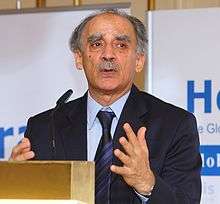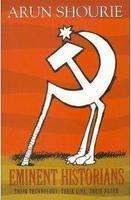Arun Shourie
| Arun Shourie | |
|---|---|
 Shourie in 2009 | |
| Minister for Telecommunication & Information Technology[1] | |
|
In office 2002–2004 | |
| Prime Minister | Atal Bihari Vajpayee |
| Preceded by | Pramod Mahajan |
| Succeeded by | Dayanidhi Maran |
| Member of Rajya Sabha | |
|
In office 1998–2004 | |
|
In office 2004–2010 | |
| Personal details | |
| Born |
2 November 1941 Jalandhar, India |
| Political party | Bhartiya Janata Party |
| Spouse(s) | Anita |
| Children | 1 |
| Residence | New Delhi |
| Alma mater |
St. Stephen's College, Delhi Syracuse University |
| Profession |
Journalist and former World Bank Economist Politician |
| Website | Arun Shourie Blog |
Arun Shourie (born 2 November 1941) is an Indian journalist, author and politician. He has worked as an economist with the World Bank, a consultant to the Planning Commission of India, editor of the Indian Express and The Times of India and a minister in the government of India (1998–2004). He was awarded the Ramon Magsaysay Award in 1982 and the Padma Bhushan in 1990.[2]
Early life
Arun Shourie was born in Jalandar, India, on 2 November 1941.[3] He studied at Modern School, Barakhamba and did his bachelor's in Economics(H) from St. Stephen's College, Delhi University.[4] He obtained his doctorate in Economics from Syracuse University in the United States and worked for the World Bank from 1967 to 1978. Simultaneously, between 1972–74, he was a consultant to the Indian Planning Commission and it was around this time that he began writing articles as a journalist, criticising economic policy.[3]
Career
Journalism
In 1975, during The Emergency imposed by then prime minister, Indira Gandhi, Shourie began writing for the Indian Express in opposition to what he saw as an attack on civil liberties. The newspaper, owned by Ramnath Goenka, was a focal point for the government's efforts at censorship.[3] He became a fellow of the Indian Council of Social Science Research in 1976.[5] In January 1979, Goenka appointed Shourie as executive editor of the newspaper, giving him a carte blanche to do with it as he saw fit.[3] He developed a reputation as an intelligent, fearless writer and editor who campaigned for freedom of the press, exposed corruption and defended civil liberties such that, in the words of Martha Nussbaum, "his dedication to the truth has won admiration throughout the political spectrum".[6]
Shourie was a winner of the Ramon Magsaysay Award in 1982, in the Journalism, Literature and Creative Communication Arts category as "a concerned citizen employing his pen as an effective adversary of corruption, inequality and injustice."[5] In 2000, he was named as one of the International Press Institute's World Press Freedom Heroes. He has also been named International Editor of the Year Award and was awarded The Freedom to Publish Award.[3]
Politics
He was nominated from the state of Uttar Pradesh as a BJP representative for two successive tenures in the Rajya Sabha, thus being a Member of Parliament for 1998–2004 and 2004–2010. He held the office of the Minister of Disinvestment, Communication and Information Technology in the government of India under Vajpayee's prime ministership.[7] As Disinvestment Minister, he led the sale of Maruti, VSNL, Hindustan Zinc among others.
Shourie was among many who objected to The Muslim Women (Protection of Rights on Divorce) Act 1986, which the government headed by Rajiv Gandhi proposed to alleviate communal violence and retain Muslim votes. Claimed by the government to be a reinforcement of India's constitutional secularism, it was widely criticised by both Muslims and Hindus. The liberals among them, says Ainslie Embree, saw it as "a capitulation to the forces of Islamic obscurantism, a return ... to the thirteenth century"; the Hindu revivalist critics thought it was "weakening Indian unity". Shourie wrote articles that tried to show that the treatment of women as required by the Quran would in fact offer them protection, although the application of Islamic law in practice was oppressing them. He was in turn criticised for what was perceived as a thinly-veiled attack on Islam itself, with Rafiq Zakaria, the Muslim scholar, saying that Shourie's concern for reform of Islam was in fact demonstrative of Hindu contempt that used the plight of Muslim women as an example of the backwardness of the community. Vir Sanghvi termed it "Hindu chauvinism with a liberal face".[8]
After the defeat of the BJP in 2009 general elections, Shourie asked for introspection and accountability within the party. He deplored factionalism within the party and those who brief journalists to aid their own agenda.[9]
Shourie has been described by Christophe Jaffrelot, a political scientist, as "a writer sympathetic to militant Hindu themes"[10] and has publicly voiced support for the aims of the Rashtriya Swayamsevak Sangh (RSS), a nationalist Hindutva organisation. This has caused unease among some of those who admire his journalism.[11] He has said that, although he sees a danger from perceived Muslim violence such as the Godhra train burning incident of 2002, people have tended to redefine the "Hindutva" term. He says that prominent members of the Bharatiya Janata Party (BJP), of which he is a member and which has ties to the RSS — specifically, L. K. Advani and Atal Bihari Vajpayee — have shown their opposition to sectarian hatred and in their attempts to make the BJP inclusive have tried to marginalise those on both the Muslim and Hindu extremes who promote such hatred.[12]
Writer
Arun Shourie has written numerous books that, according to Nussbaum, are
recognisably the creation of a smart, determined, muckraking journalist, They are polemical, ad hominem, often extremely shrill in tone. ... But despite their style, the books are obviously the work of a brilliant man, with a wide if idiosyncratic learning, a passion for the freedoms of speech and press, and a desire to get beneath current events to address underlying issues.[11]
His writings have gained him a considerable following. They were initially on a diverse range of subjects related to his journalistic interests, including corruption and polemics against B. R. Ambedkar and left-wing historians. He subsequently concentrated his polemicism mostly on issues relating to the detrimental effects of religion on society, producing critiques of Christianity, Hinduism and Islam. With the exception of Gandhi, he has little time for any religious thinker and, says Nussbaum, his books "nowhere ... seek to provide balance; nowhere is there a sense of complexity. All have the same mocking, superior tone."[13]
The historian D.N. Jha has accused Shourie of distorting his writings, and making false allegations of plagiarism against him. According to Jha, Shourie's views expressed in the book Eminent Historians, which concerned the NCERT controversy, contains "slander" and "has nothing to do with history."[14][15][16]
Publications
- Does He Know a Mother's Heart? How Suffering Refutes Religions (2011, ISBN 9789350290910)
- We Must Have No Price
- Worshipping False Gods (2012, ISBN 9789350293430)
- A Secular Agenda: For Saving Our Country, for Welding it (1993, ISBN 9788190019934),
- Eminent Historians: Their Technology, Their Line, Their Fraud (1998, ISBN 81-900199-8-8)
- Falling Over Backwards: An essay against Reservations and against Judicial populism (2012, ISBN 9789350293553)
- The World of Fatwas or the Sharia in Action: (2012, ISBN 9789350293423)
- Are We Deceiving Ourselves Again
- Where Will All This Take Us
- The Parliamentary System
- Courts and their Judgements: Premises, Prerequisites, Consequences
- Governance and the sclerosis that has set in (2005, ISBN 9788129105240)
- Harvesting Our Souls
- Hinduism: Essence and Consequence
- Indian Controversies
- Individuals, Institutions, Processes : How One may Strengthen the Other in India Today
- Institutions in the Janata Phase
- Missionaries in India
- Arun Shourie and his Christian critics
- Mrs Gandhi's Second Reign
- Only Fatherland : Communists, 'Quit India,' and the Soviet Union
- Religion in Politics
- Symptoms of Fascism
- These Lethal, Inexorable Laws: Rajiv, His Men and His Regime
- The State As Charade: V. P. Singh, Chandra Shekhar and the Rest
- Will the Iron Fence Save a Tree Hollowed by Termites?
- Self=Deception : India’s China Policies Origins, Premises, Lessons - Lessons the Chinese Taught Pandit Nehru but Which We Refuse to Learn ]] (ISBN 9789351160939)
Co-author:
- with Sita Ram Goel, Harsh Narain, Jay Dubashi and Ram Swarup, Hindu Temples - What Happened to Them Vol. I, (A Preliminary Survey) (1990, ISBN 81-85990-49-2)
- with Sita Ram Goel, Koenraad Elst, Ram Swarup, Freedom of expression — Secular Theocracy Versus Liberal Democracy, Voice of India (1998).
- with Arun Jaitley, Swapan Dasgupta, Rama J Jois, Harsh Narain-The Ayodhya Reference:Suprema Court judgment and commentaries, Voice of India(1994)
IIT Kanpur
In 2000, Shourie pledged the entire amount (Rs. 120 million) of discretionary spending available to him under Members of Parliament Local Area Development Scheme (MPLADS) to setting up of Bio-Sciences & Bio-engineering Department at the Indian Institute of Technology Kanpur.[17] In 2005, he again pledged Rs. 110 million for developing a separate building for Environmental Sciences and Environmental Engineering at the institute.
Personal life
Shourie is married to Anita, and they have a son.[18] His sister is the journalist Nalini Singh.[4]
References
Citations
- ↑ http://www.dot.gov.in/about-us/former-ministers
- ↑ "Padma Awards" (PDF). Ministry of Home Affairs, Government of India. 2015. Archived from the original (PDF) on 15 November 2014. Retrieved July 21, 2015.
- 1 2 3 4 5 International Press Institute
- 1 2 "Nalini Singh's daughter Ratna writes novel about mother-daughter troubled relationship". The Sunday Guardian. 9 August 2014.
- 1 2 Magsaysay Foundation (2012)
- ↑ Nussbaum (2009), p. 61
- ↑ Jaffrelot, Christophe, ed. (2009). Hindu Nationalism: A Reader. Princeton University Press. p. 344. ISBN 978-1-40082-803-6.
- ↑ Embree (1990), pp. 107-111
- ↑ Indian Express (2009)
- ↑ Jaffrelot (1996), p. 353
- 1 2 Nussbaum (2009), p. 62
- ↑ Nussbaum (2009), pp. 66-68
- ↑ Nussbaum (2009), p. 63
- ↑ "Grist to the reactionary mill". Indian Express. 9 July 2014. Retrieved 9 July 2015.
- ↑ "How History Was Unmade At Nalanda! D N Jha". Kafila. 9 July 2014. Retrieved 9 July 2015.
- ↑ "Votes do not guide intellectuals: D N Jha". Business Standard. 9 November 2014. Retrieved 9 July 2015.
- ↑ Shourie gives Rs 12 crore to IIT-Kanpur!
- ↑ God's an invention to suit society's needs: Arun Shourie
Bibliography
- Embree, Ainslie Thomas (1990), Utopias in Conflict: Religion and Nationalism in Modern India, University of California Press, ISBN 9780520068667
- Indian Express (24 August 2009), "Arun Shourie hits out at BJP top leadership", Indian Express, retrieved 2 May 2014
- International Press Institute, Arun Shourie, India: World Press Freedom Hero, International Press Institute, archived from the original on 2012-10-14, retrieved 1 May 2014
- Jaffrelot, Christophe (1996), The Hindu Nationalist Movement and Indian Politics: 1925 to the 1990s : Strategies of Identity-building, Implantation and Mobilisation, C. Hurst & Co., ISBN 9781850651703
- Magsaysay Foundation (2012), Shourie, Arun: Citation, Ramon Magsaysay Award Foundation, retrieved 1 May 2012
- Nussbaum, Martha (2009), The Clash Within: Democracy, Religious Violence, and India's Future, Harvard University Press, ISBN 9780674041561
External links
| Wikiquote has quotations related to: Arun Shourie |
